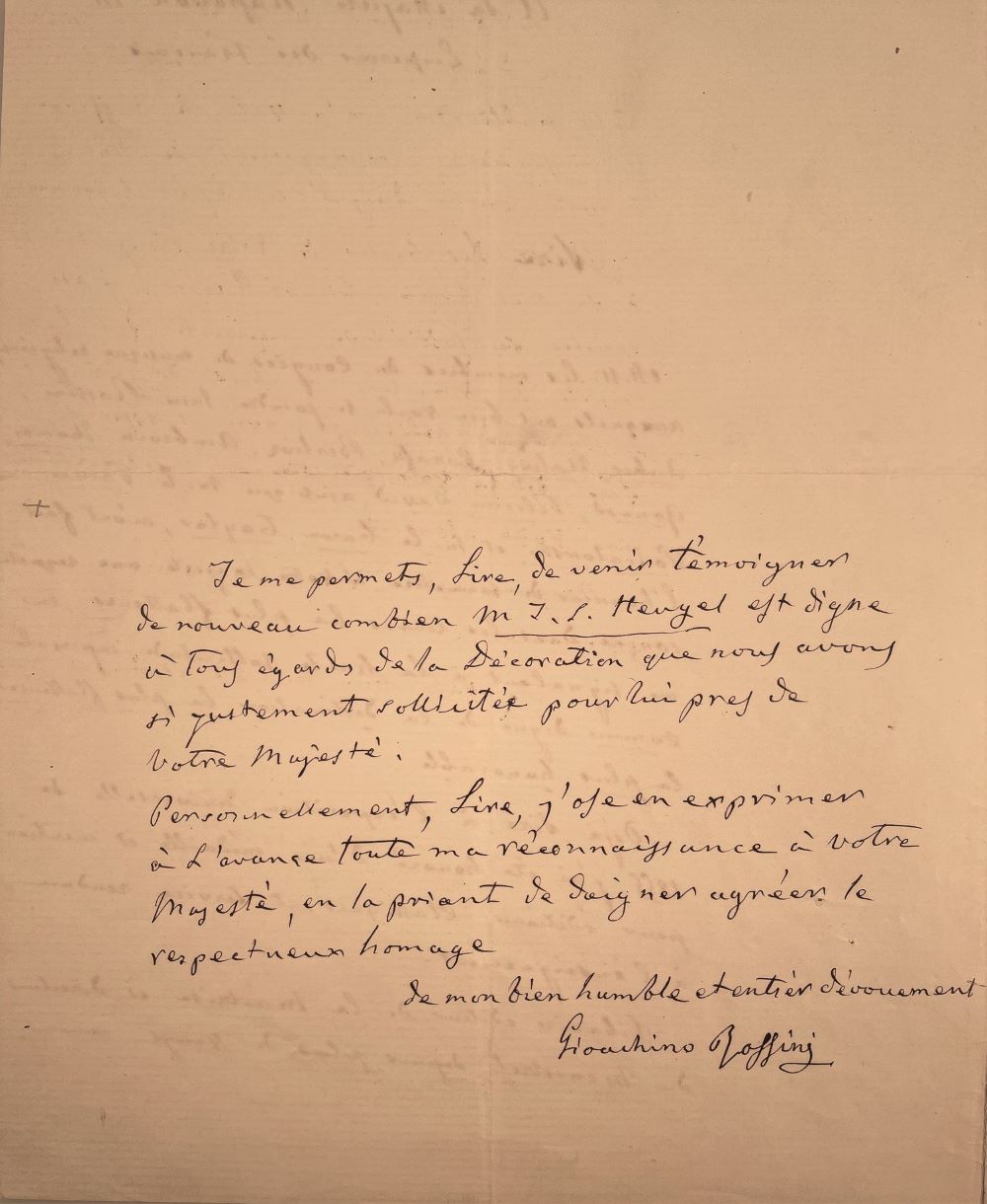ROSSINI, Gioachino [1792-1868]: Autograph letter with signature, together with a letter signed by J.L. Heugel to Napoleon III. Paris, 28. Mai 1862. Quarto 31.5 x 21.3 cm. 3 pages as a double sheet, folded in two, with postal receipt stamp of the Imperial Cabinet.
Artikelnummer: 27756
4900,00 €
Steuerbetrag
Standardisierter Preis / COM_VIRTUEMART_UNIT_SYMBOL_:
-
Letter of recommendation to Napoleon III for the publisher Heugel in Paris. Rossini confirms his recommendation for his publisher in Paris, Jacques-Leopold Heugel (1815-83), in his letter of request to Napoleon III. (Charles-Louis-Napoléon Bonaparte). Heugel asked the French emperor on behalf of selected members of the religious music congress, which had taken place from Nov. 27th to Dec. 1st. 1860 in Paris, for the Emperor's support: "The members of the religious music congress, joined by Rossini, Auber, Halévy, Carafa, Berlioz, Ambroise Thomas, Gounod, Félicien David, as well as Prince Poniatowski and Baron Taylor, have done me the honor of submitting to Her Majesty a request formulated in the most flattering terms, and of indicating myself worthy of the high imperial care for the most flattering and honorable purpose ... As bookseller and editor of the Maitrise [Journal de Musique Religieuse] and director of the Ménestrel [Journal Musique et Théatres] for more than twenty years, I have the confidence to have founded a house as honorable as it is important, which had the honor of publishing the art book of Queen Hortense [mother of Napolean III] in 1850. This publication has earned me the approval and valuable encouragement of Her Majesty, who has deigned to authorize the homage. Imbued with Her Majesty's goodness and supreme benevolence, I venture to direct Her Imperial solicitude to the request of mm [gentlemen] members of the Congress of Religious Music, in the hope, Sire, that it will be considered by Her Majesty. Approve, Sire, the respectful tributes ..." Rossini confirms the dignity of his publisher: "I take the liberty, Sire, to testify once again how worthy Mr. J.L. Heugel is in every respect of the distinction which we have rightly requested for him from Her Majesty. Personally, Sire, I venture to express in advance my gratitude to Her Majesty and to ask her to approve the respectful homage." Rossini was the appropriate person for such a recommendation, since there was a very good relationship between Napoleon and him: on April 12, 1853, Rossini was immediately promoted from "Chevalier" of Napoleon's Legion of Honor to "Commandeur", in the summer of 1862 Rossini had received a precious gift from Napoleon (see letter Rossini dated 8/3/1862 to F. Santocanale) and towards the end of 1862 he was asked by Baroness De Rothschild to compose a ceremonial piece for an upcoming visit of Napoleon in the new house of the Rothschilds and in the guest book Rossini's signature in the golden guest book stood to his honor directly under that of Napoleon (cf. Weinstock, H: Rossini, Adliswil 1981, p. 355). This letter, coordinated and combined between music publisher and its most famous Italian composer, is an interesting testimony to the importance that privileges granted by the French Emperor and a personal endorsement still had on the music scene in 1862. In addition, Heugel's comments about the "Livre d'art de la Reine Hortense" offer for the first time a secure source about the actual year of publication of this particular work "publiée en 1850", which was previously unknown and estimated between 1850 and 1860. - Provenance of the letter: Arturo Toscanini Collection. EMPFEHLUNG AN NAPOLEON III. FÜR DEN VERLEGER HEUGEL Rossini bestätigt seine Empfehlung für seinen Verleger Jacques-Leopold Heugel (1815-83) in dessen Bittschreiben an Napoleon III. (Charles-Louis-Napoléon Bonaparte). Huegel bittet in seinem Schreiben an den französchen Kaiser im Namen ausgewählter Mitglieder des religiösen Musikkongesses, welcher vom 27.11. bis 1.12.1860 in Paris stattgefunden hatte, um Unterstützung des Kaisers: "Die Mitglieder des religiösen Musikkongresses, denen sich Rossini, Auber, Halévy, Carafa, Berlioz, Ambroise Thomas, Gounod, Félicien David sowie Fürst Poniatowski und Baron Taylor anschlossen, haben mir die Ehre erwiesen, Ihrer Majestät eine in den schmeichelhaftesten Worten formulierte Bitte zu unterbreiten und mich der hohen kaiserlichen Fürsorge als würdig für die schmeichelhafteste und ehrenvollste Bestimmung anzuzeigen... Als Buchhändler und Herausgeber der Maitrise [Journal de Musique Religieuse] und Direktor des Ménestrel [Journal Musique et Théatres] seit über zwanzig Jahren habe ich das Vertrauen, ein ebenso ehrenwertes wie wichtiges Haus gegründet zu haben, das die Ehre hatte, 1850 das Kunstbuch der Königin Hortense [Mutter von Napolean III.] zu veröffentlichen. Diese Veröffentlichung hat mir die Zustimmung und eine wertvolle Ermutigung Ihrer Majestät eingebracht, die sich dazu herabgelassen hat, die Hommage zu genehmigen. Durchdrungen von der Güte Ihrer Majestät und ihrem höchsten Wohlwollen, wage ich es, ihre kaiserliche Fürsorge auf die Bitte von mm [Herren] Mitgliedern des Kongresses für religiöse Musik zu richten, in der Hoffnung, Sire, dass sie von Ihrer Majestät in Betracht gezogen wird. Genehmigen Sie, Sire, die respektvollen Huldigungen..." Rossini bestätigt die Würde seines Verlegers: "Ich erlaube mir, Sire, erneut zu bezeugen, wie würdig Herr J.L. Heugel in jeder Hinsicht der Auszeichnung ist, die wir zu Recht bei Ihrer Majestät für ihn beantragt haben. Persönlich, Sire, wage ich es, Ihrer Majestät im Voraus meine Dankbarkeit auszusprechen und sie zu bitten, die respektvolle Huldigung zu genehmigen." Dieser zwischen Musikverleger und seinem berühmtesten italienischen Komponisten koordinierte und kombinierte Brief ist ein Interessantes Zeugnis dafür, welche Bedeutung noch 1862 vom französischen Kaiser verliehene Privilegien und persönliche Unterstützung für die Musikszene hatten. Zudem bieten die Ausführungen Heugels über das "Livre d'art de la Reine Hortense" erstmals eine gesicherte Quelle über das tatsächliche Erscheinungjahr "publiée en 1850", das bisher nicht bekannt war und zwischen 1850 und 1860 eingeschätzt wurde. - Provinienz des Briefes: Sammlung Arturo Toscanini.



